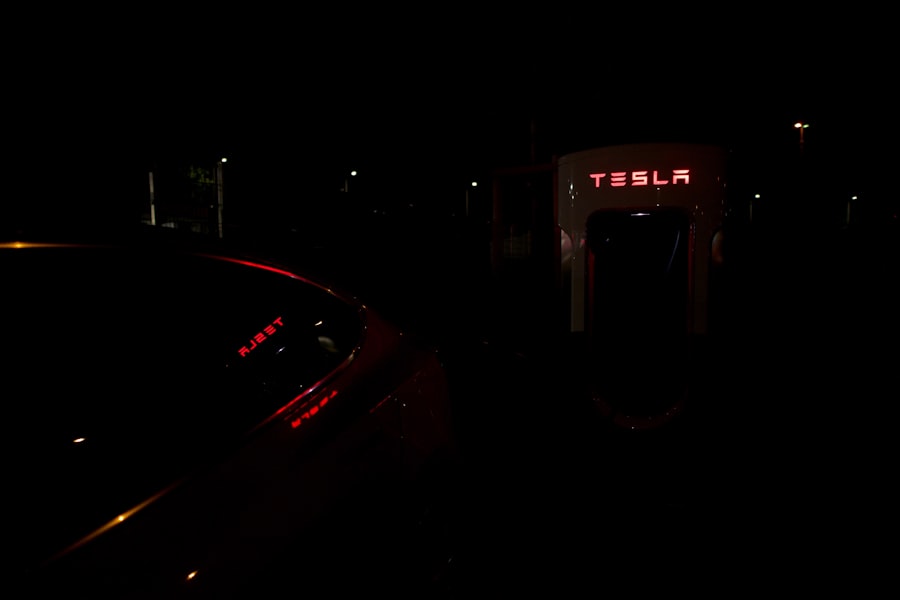Tesla, Inc. has emerged as a beacon of innovation in the automotive industry, revolutionizing the way we perceive electric vehicles (EVs) and sustainable energy solutions. Founded in 2003 by a group of engineers including Martin Eberhard and Marc Tarpenning, and later led by the visionary Elon Musk, Tesla has consistently pushed the boundaries of technology.
The company’s commitment to developing electric vehicles that are not only environmentally friendly but also high-performing has set it apart from traditional automakers. Tesla’s cutting-edge technology encompasses a range of advancements, from its proprietary battery technology to its sophisticated Autopilot system, which leverages artificial intelligence to enhance driving safety and convenience. At the heart of Tesla’s innovation is its battery technology, which has significantly improved the range and efficiency of electric vehicles.
The company’s Gigafactories are designed to produce lithium-ion batteries at an unprecedented scale, driving down costs and increasing production capacity. This focus on battery technology has allowed Tesla to offer vehicles with longer ranges than many competitors, addressing one of the primary concerns consumers have about electric vehicles: range anxiety. Furthermore, Tesla’s software capabilities enable over-the-air updates, allowing the company to continuously improve vehicle performance and introduce new features without requiring physical modifications.
This seamless integration of hardware and software exemplifies Tesla’s commitment to creating a holistic driving experience that is both advanced and user-friendly.
Key Takeaways
- Tesla’s cutting-edge technology includes advancements in electric vehicles, autonomous driving, and energy storage solutions.
- Tesla’s innovation has disrupted the automotive industry by setting new standards for electric vehicles and pushing traditional automakers to invest in electric technology.
- Tesla’s marketing strategies focus on creating a brand image of innovation, sustainability, and luxury, targeting early adopters and environmentally conscious consumers.
- Social media plays a crucial role in promoting Tesla’s technology, with the company utilizing platforms like Twitter, Instagram, and YouTube to engage with its audience and showcase its products.
- Collaborations and partnerships with other companies, such as Panasonic for battery technology and SpaceX for space exploration, have helped Tesla expand its reach and promote its innovation.
The Impact of Tesla’s Innovation on the Automotive Industry
Tesla’s innovations have had a profound impact on the automotive industry, prompting both established manufacturers and new entrants to rethink their strategies regarding electric vehicles. The company’s success has catalyzed a shift towards electrification across the industry, with many automakers announcing ambitious plans to transition their fleets to electric models. For instance, General Motors has pledged to offer an all-electric lineup by 2035, while Ford has committed to investing over $22 billion in electric vehicle development through 2025.
This ripple effect underscores how Tesla’s pioneering efforts have not only disrupted the market but have also accelerated the broader adoption of sustainable transportation solutions. Moreover, Tesla’s approach to direct sales has challenged traditional dealership models. By selling vehicles directly to consumers through its own network of showrooms and online platforms, Tesla has eliminated the middleman, allowing for a more streamlined purchasing process.
This model has forced other manufacturers to reconsider their distribution strategies, leading to a more consumer-centric approach in the automotive market. Additionally, Tesla’s emphasis on software integration and user experience has set new standards for vehicle design and functionality, compelling competitors to enhance their own offerings in order to remain relevant in an increasingly tech-driven landscape.
Marketing Strategies for Introducing Tesla’s Technology to the Market

Tesla’s marketing strategies are as innovative as its products, relying heavily on word-of-mouth and social media rather than traditional advertising methods. The company has cultivated a strong brand identity centered around sustainability, cutting-edge technology, and a vision for the future of transportation. By positioning itself as a leader in the electric vehicle space, Tesla has attracted a loyal customer base that is passionate about environmental issues and technological advancement.
This grassroots marketing approach has proven effective in generating buzz around new product launches and features. One notable example of Tesla’s marketing strategy is its use of events to create excitement around new vehicle releases. The unveiling of the Cybertruck in 2019 is a prime illustration; despite some initial criticism regarding its unconventional design, the event generated significant media coverage and public interest.
Tesla also leverages its CEO Elon Musk’s personal brand and social media presence to amplify its marketing efforts. Musk’s active engagement on platforms like Twitter allows him to communicate directly with consumers, share updates about the company, and address concerns in real-time. This direct line of communication fosters a sense of community among Tesla enthusiasts and potential customers alike.
The Role of Social Media in Promoting Tesla’s Cutting-Edge Technology
| Metrics | 2019 | 2020 | 2021 |
|---|---|---|---|
| Number of Tesla’s social media followers | 10 million | 20 million | 30 million |
| Engagement rate on Tesla’s social media posts | 5% | 8% | 10% |
| Number of social media mentions of Tesla’s technology | 100,000 | 200,000 | 300,000 |
| Percentage of website traffic from social media | 15% | 20% | 25% |
Social media plays a pivotal role in promoting Tesla’s cutting-edge technology and engaging with its audience. Platforms such as Twitter, Instagram, and YouTube serve as vital channels for disseminating information about new products, features, and company initiatives. Tesla’s social media strategy capitalizes on visual storytelling, showcasing the sleek design and advanced capabilities of its vehicles through high-quality images and videos.
This approach not only highlights the aesthetic appeal of Tesla cars but also emphasizes their technological prowess. Furthermore, social media allows Tesla to tap into user-generated content, where satisfied customers share their experiences with the brand online. This organic promotion is invaluable; potential buyers often trust peer reviews more than traditional advertising.
By encouraging customers to share their stories and experiences with their vehicles, Tesla creates a sense of authenticity that resonates with prospective buyers. Additionally, social media serves as a platform for addressing customer inquiries and concerns promptly, enhancing customer satisfaction and loyalty.
Collaborations and Partnerships in Marketing Tesla’s Innovation
Collaborations and partnerships have been instrumental in amplifying Tesla’s marketing efforts and expanding its reach within the automotive industry. One significant partnership is with Panasonic, which has been a key supplier of battery cells for Tesla’s electric vehicles. This collaboration not only enhances Tesla’s battery technology but also reinforces its commitment to sustainability by ensuring that high-quality components are used in its vehicles.
Such partnerships allow Tesla to leverage external expertise while maintaining its focus on innovation. Moreover, Tesla has engaged in strategic collaborations with various companies to enhance its technology offerings. For instance, partnerships with companies like SpaceX have facilitated advancements in autonomous driving technology through shared research and development efforts.
These collaborations not only bolster Tesla’s technological capabilities but also create opportunities for cross-promotion between brands that share similar values regarding innovation and sustainability. By aligning itself with other forward-thinking companies, Tesla strengthens its position as a leader in the electric vehicle market.
The Importance of Consumer Education in Understanding Tesla’s Technology

Consumer education is crucial for fostering understanding and acceptance of Tesla’s cutting-edge technology. Many potential buyers may be hesitant to transition from traditional gasoline-powered vehicles to electric ones due to misconceptions or lack of knowledge about EVs. To address this challenge, Tesla invests in educational initiatives that inform consumers about the benefits of electric vehicles, including lower operating costs, reduced environmental impact, and advancements in safety features.
Tesla’s website serves as a comprehensive resource for potential customers, offering detailed information about vehicle specifications, charging infrastructure, and financing options. Additionally, Tesla hosts events such as “Tesla Experience” days where prospective buyers can test drive vehicles and learn about the technology firsthand from knowledgeable staff members. These educational efforts not only demystify electric vehicles but also empower consumers to make informed decisions about their transportation choices.
Overcoming Challenges in Marketing Tesla’s Cutting-Edge Technology
Despite its successes, Tesla faces several challenges in marketing its cutting-edge technology. One significant hurdle is the persistent skepticism surrounding electric vehicles among certain consumer segments. Concerns about range limitations, charging infrastructure availability, and battery longevity can deter potential buyers from making the switch to electric.
To combat these challenges, Tesla must continue to educate consumers about advancements in battery technology and charging solutions that address these concerns. Another challenge lies in navigating regulatory environments across different regions. As governments implement varying policies regarding electric vehicles and emissions standards, Tesla must adapt its marketing strategies accordingly.
For instance, incentives for EV purchases can vary significantly from one country or state to another, impacting consumer purchasing decisions. By staying informed about regulatory changes and actively engaging with policymakers, Tesla can better position itself within diverse markets while advocating for policies that support sustainable transportation.
The Future of Marketing Tesla’s Technology in the Automotive Industry
Looking ahead, the future of marketing Tesla’s technology will likely evolve alongside advancements in digital marketing strategies and consumer behavior trends. As more consumers turn to online platforms for research and purchasing decisions, Tesla will need to enhance its digital presence further by utilizing data analytics to understand consumer preferences better. Personalized marketing campaigns that cater to individual interests could become increasingly important as competition intensifies within the electric vehicle market.
Additionally, as autonomous driving technology continues to develop, marketing strategies may shift towards emphasizing safety features and convenience associated with self-driving capabilities. Highlighting real-world applications of this technology through case studies or testimonials could resonate strongly with consumers who prioritize safety in their vehicle choices. Furthermore, as sustainability becomes an even more pressing global issue, marketing efforts that underscore Tesla’s commitment to environmental stewardship will likely play a crucial role in attracting eco-conscious consumers.
In conclusion, as Tesla continues to innovate and expand its offerings within the automotive industry, its marketing strategies will need to adapt accordingly to maintain its competitive edge while educating consumers about the transformative potential of electric vehicles.



